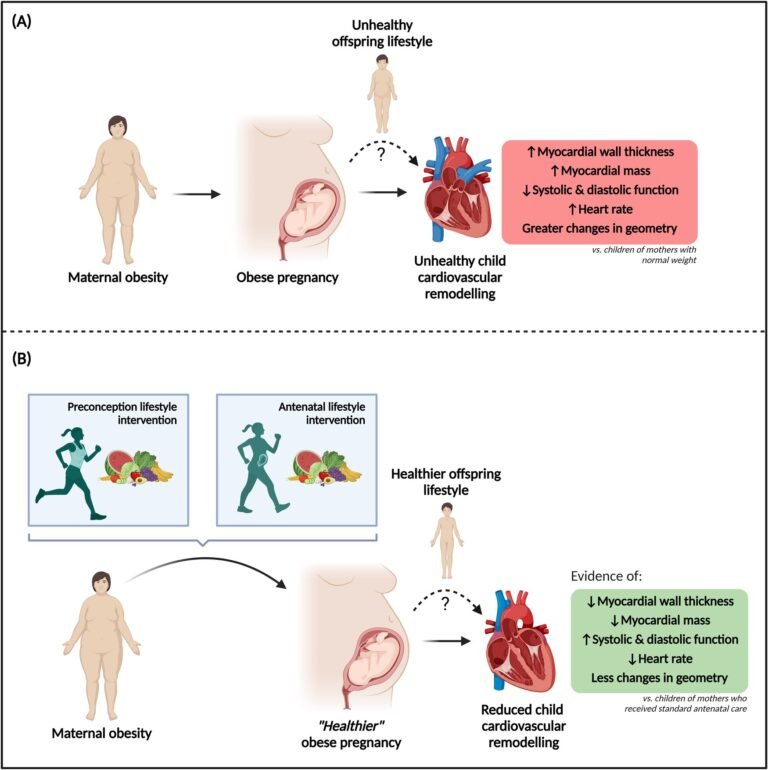
Benefits of preconception and prenatal lifestyle interventions in obese women on cardiovascular health in their children. Impact of maternal obesity on cardiovascular remodeling in children (A) and protective effect of preconception and prenatal lifestyle interventions (B). Figure created by BioRender.com. Credits: International Journal of Obesity (2024). Publication date: 10.1038/s41366-024-01536-0
Researchers from King’s College have identified evidence suggesting that lifestyle changes may be able to offset the risk of adult heart disease caused by maternal obesity and changes in fetal heart development.
Rates of obesity during pregnancy are increasing globally, with more than 50% of women attending antenatal clinics in England and Wales being classed as overweight (28.5%) or obese (22.7%). Recent research has shown that maternal obesity may lead to cardiovascular health complications and abnormal cardiac development in children.
According to a recently published article, International Journal of ObesityResearchers led by Dr. Samuel Baden conducted a systematic review of existing data from studies that investigated whether lifestyle interventions for maternal obesity before or during pregnancy translate into better heart health for children.
The research team identified studies based on predefined criteria and included randomized trials of lifestyle interventions for obese pregnant women, such as antenatal exercise, diet, and physical activity.
The studies reviewed suggest that lifestyle interventions for obese women may be able to prevent abnormal cardiac “development” in their children. This includes all the benefits typically associated with improved heart health, such as reduced thickening of the heart walls, normal heart weight, and reduced risk of elevated heart rates.
“We and other researchers have found that maternal obesity is associated with indicators of poor cardiac development in children.
“We reviewed the existing literature on whether diet and exercise interventions for obese women before or during pregnancy can reduce the effects of obesity and found evidence that these interventions do indeed prevent unhealthy cardiac development in their children.
“If these findings persist into adulthood, these interventions may protect against the adverse cardiovascular disease outcomes experienced by the adult offspring of obese women and may inform public health strategies to improve cardiovascular health in the next generation,” said Samuel Baden, PhD, a research scientist in the Division of Women’s and Children’s Health.
Although evidence suggests that lifestyle interventions for obese women may be protective against infant cardiovascular disease risk, further longitudinal studies with larger sample sizes and older children are needed to confirm these observations and determine whether these changes persist into adulthood.
If confirmed in future studies, the authors suggest that these findings could inform public health strategies to improve the cardiovascular health of the next generation.
For more information:
Samuel J. Baden et al. “Maternal Obesity and Offspring Cardiovascular Remodeling – Impact of Preconception and Prenatal Lifestyle Interventions: A Systematic Review” International Journal of Obesity (2024). Publication date: 10.1038/s41366-024-01536-0
Courtesy of King’s College London
Quote: Diet and exercise in obese mothers may lower cardiovascular risk in children (July 9, 2024) Retrieved July 9, 2024 from https://medicalxpress.com/news/2024-07-diet-obese-mothers-cardiovascular-children.html
This document is subject to copyright. It may not be reproduced without written permission, except for fair dealing for the purposes of personal study or research. The content is provided for informational purposes only.


